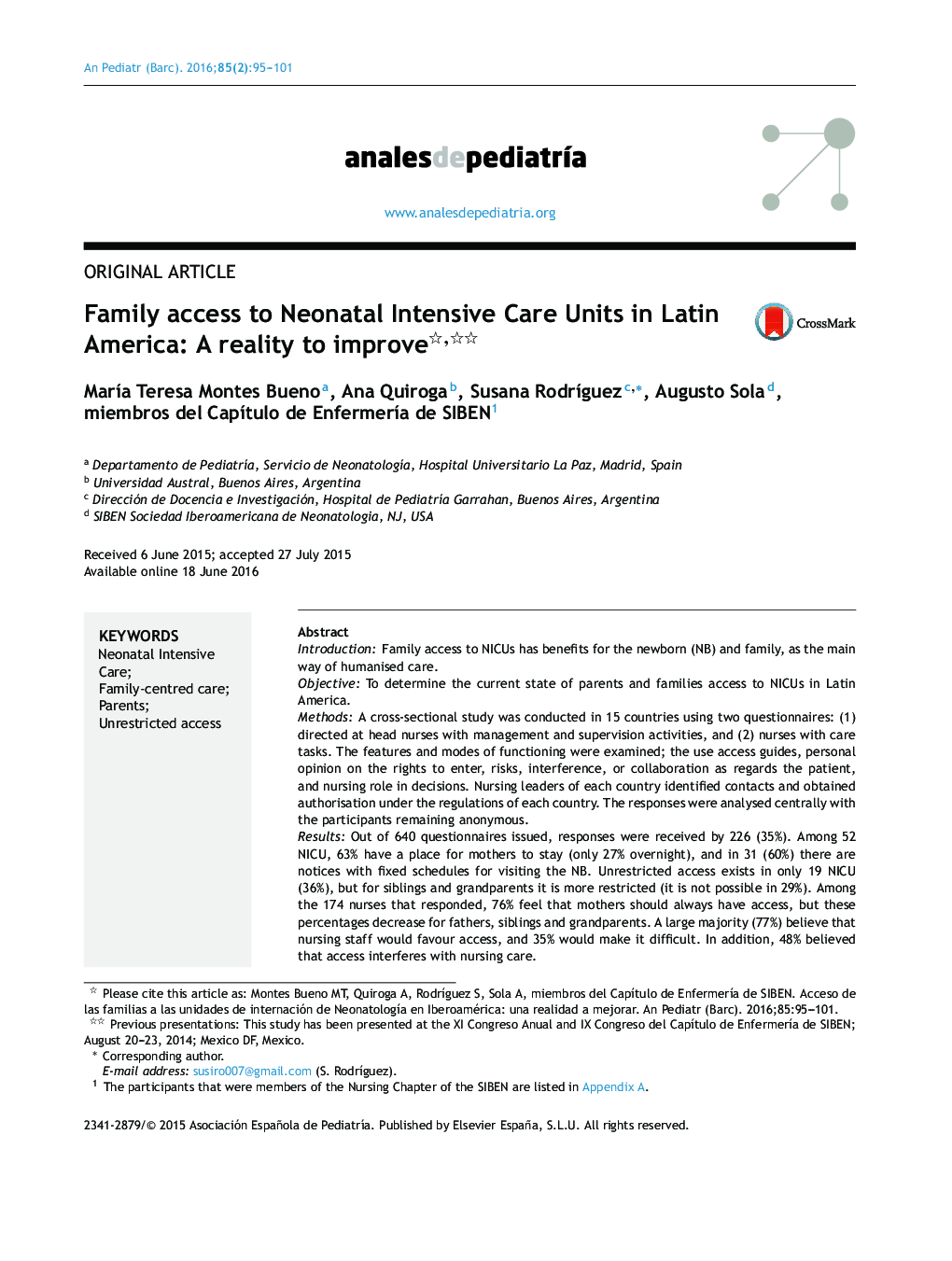| کد مقاله | کد نشریه | سال انتشار | مقاله انگلیسی | نسخه تمام متن |
|---|---|---|---|---|
| 4144935 | 1272575 | 2016 | 7 صفحه PDF | دانلود رایگان |
IntroductionFamily access to NICUs has benefits for the newborn (NB) and family, as the main way of humanised care.ObjectiveTo determine the current state of parents and families access to NICUs in Latin America.MethodsA cross-sectional study was conducted in 15 countries using two questionnaires: (1) directed at head nurses with management and supervision activities, and (2) nurses with care tasks. The features and modes of functioning were examined; the use access guides, personal opinion on the rights to enter, risks, interference, or collaboration as regards the patient, and nursing role in decisions. Nursing leaders of each country identified contacts and obtained authorisation under the regulations of each country. The responses were analysed centrally with the participants remaining anonymous.ResultsOut of 640 questionnaires issued, responses were received by 226 (35%). Among 52 NICU, 63% have a place for mothers to stay (only 27% overnight), and in 31 (60%) there are notices with fixed schedules for visiting the NB. Unrestricted access exists in only 19 NICU (36%), but for siblings and grandparents it is more restricted (it is not possible in 29%). Among the 174 nurses that responded, 76% feel that mothers should always have access, but these percentages decrease for fathers, siblings and grandparents. A large majority (77%) believe that nursing staff would favour access, and 35% would make it difficult. In addition, 48% believed that access interferes with nursing care.ConclusionA cultural change is needed in the NICUs in Latin America in order to respect the rights of newborns and their families during hospitalisation.
ResumenIntroducciónEl ingreso de la familia en UCIN trae beneficios al RN y su familia, como eje de la atención humanizada.ObjetivoConocer el estado actual sobre acceso de padres y familias en UCIN de Iberoamérica.MétodosEstudio transversal en 15 países de Iberoamérica. Dos cuestionarios: 1) para enfermeros jefes con tareas de gestión y conducción, y 2) para enfermeros en tarea asistencial. Se exploró sobre características y modalidades de funcionamiento; uso de guías de acceso, opinión personal sobre derecho a ingresar, riesgos, interferencias o colaboración relacionadas al ingreso, y papel de enfermería en las decisiones. Líderes de enfermería de cada país identificaron contactos y obtuvieron autorización según regulaciones de cada país. Las repuestas fueron analizadas en forma centralizada sin identificación del participante.ResultadosSeiscientos cuarenta cuestionarios; respuesta en 226 (35%). Entre 52 UCIN, el 63% dispone de lugar para estancia de madres (solo el 27% durante la noche); en el 31 (60%) existen carteles que indican sobre horarios fijos para «visitas» de padres. El ingreso irrestricto existe en solo 19 UCIN (36%); para hermanos y abuelos es más restringido (en el 29% no es posible). Entre las 174 enfermeras, el 76% considera que las madres deben acceder siempre, pero estos porcentajes disminuyen para padres, hermanos y abuelos; el 77% opina que enfermería favorece y el 35% que dificulta el acceso. Adicionalmente, el 48% opina que el ingreso interfiere con tareas de enfermería.ConclusiónEs necesario un cambio cultural en las UCIN de Iberoamérica para que se respeten los derechos de los RN y sus familias durante la internación.
Journal: Anales de Pediatría (English Edition) - Volume 85, Issue 2, August 2016, Pages 95–101
